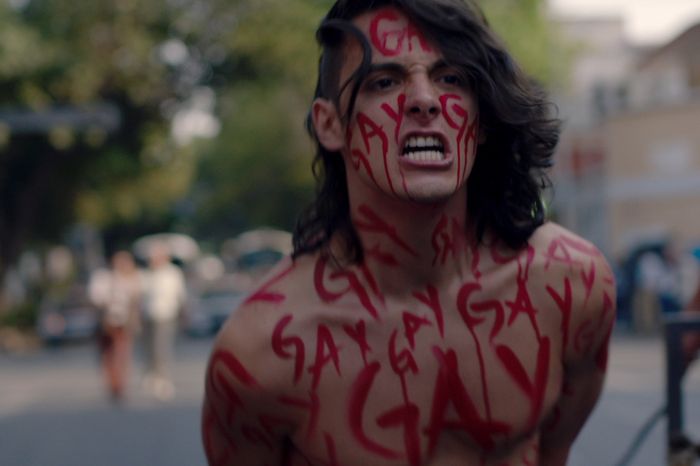
Life is pretty boring for Carlos (Xabiani Ponce de León), a teenager in mid-’80s Mexico City in Hari Sama’s semi-autobiographical This Is Not Berlin, which just had its U.S. premiere at Sundance. After-school activities are limited to pointless macho rumbles with boys from neighboring schools, his father is pressuring him to become an engineer, while his mom is drugging herself to sleep all day. (Mom is played by brand-new Oscar nominee Marina de Tavira, but that’s small consolation.)
Luckily, Carlos has two things going for him: 1. he’s a mechanical prodigy, and 2. with his enormous eyes, elfin features, and flowing mane, he’s essentially an anime character made flesh. After fixing a synth for a local New Wave band, Carlos and his pal Gera (José Antonio Toledano) are granted entrance into a club called Azteca and its exciting new world of polyamory, eyeliner, and confrontational public art stunts. (“Is this a gay bar?” they ask. The answer: “It’s an everything bar.”) As in Sing Street, our hero’s journey through the ’80s alternative scene is symbolized by his changing hairstyle — first an unruly mess, then a chic lob, finally an asymmetrical undercut — and he only gets more beautiful with each one. The only characters in this movie who do not want to fuck him are blood relatives, and honestly, even they might make an exception.
Films like This Is Not Berlin often have to deal with what I call the Boogie Nights conundrum: It’s hard to get invested in all the madcap hedonism of the first half when you’re simultaneously dreading the inevitable comedown in the second. But Sama — who does double-duty as Carlos’s shaggy biker uncle — brings the attractions of the scene to life so well I briefly considering quitting my 9-to-5 to become a pansexual New Wave performance artist, too. Whether they’re stripping naked, dousing themselves in blood, and chowing down on hearts; stripping naked in soccer jerseys to mock Mexico’s 1986 World Cup team; or stripping naked and coating themselves in flour, it’s easy to see the appeal their of bold, unapologetic queerness. They feel free in a way everyone else does not. There’s a bit of trouble in that Carlos might not actually be gay, but who’s counting? The scene is not about being popular, he tells one of his many romantic interests near the end of the film; “it’s about doing things and finding people that make you feel less alone.” That he’s a little bit full of shit only makes it more fun.
Inevitably, the music has to end sometime, and there are the obligatory overdoses, broken friendships, and nods to the AIDS crisis. But Sama doesn’t dwell on it. Like Roma, these are the personal reminisces of a filmmaker who turned out pretty okay, one who can look back on his youthful foibles with clear eyes, but no small amount of warmth.


